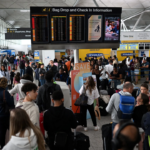Teaching is a tempting profession in the UK. Figures show that a secondary school teacher with more than five years of educational experience can earn 35,000 to 38,000 pounds a year, while in the London area, it can reach 43,000 to 46,000 pounds, equivalent to 380,000 to 410,000 yuan. University teachers are paid even more, with an average yearly salary of up to 72,000 pounds. This salary makes many students interested in staying in the UK to work, so how can you be a teacher in the UK?
British Semester
In the UK, the academic year is divided into three main semesters, and the holiday cycle is relatively long. The holidays after the first semester are from mid to late December to early January, equivalent to China’s winter holiday, and the holiday lasts almost 15-20 days. The second semester is from the beginning of January to the end of March; the holiday is usually from the end of March to the end of April, during which we have to go through British Easter; the length of the holiday is also about 15-20 days. The third term is the summer holiday from mid-July to early September. In addition, UK primary and secondary schools have short breaks, and there is also a Half-term break of around 3-7 days in the spring, summer, and autumn terms.
Teacher Shortage

In January, The Times reported that millions of British adults lack numeracy skills, even at the primary school level. In the summer of 2022, some 230,000 British pupils will take their GCSE (equivalent to the Chinese secondary school exam) maths exams twice, and only 20 per cent will pass after two or even more attempts.
To change public attitudes towards maths illiteracy, Prime Minister Rishi Sunak will make the strongly worded case that adults who don’t know basic maths should be embarrassed. Sunnucks will suggest that poor maths skills are damaging the UK economy. He will announce the creation of a new qualification for primary school maths teachers, promising to increase the number of maths centres to transfer knowledge and suitable teaching methods to other schools.
However, Sunnucks faces questions about the feasibility of the reforms, given the insufficient number of maths teachers. Nearly half of Britain’s secondary schools rely on non-specialist teachers to teach maths; ministers still need to meet their targets for recruiting maths teachers every year since the 2012-13 academic year. Increasing allowances for teachers, expanding the number of students per class, offering more online courses? None of these solutions will solve the underlying problem because young people don’t want to be teachers!
Meanwhile, the UK government and teachers remain in a severe pay dispute. Between 2010 and 2022, teachers’ pay in the UK fell by an average of 11 per cent. A teacher currently earns between £28,000 and £38,810 a year, which is equivalent to between €32,000 and €44,100.
How to be a Teacher
Early Childhood Education

Early Years Teachers usually work in a Kindergarten or Nursery, teaching children aged 0-5 in some subjects. The corresponding teaching qualification is called Early Years Teacher Status (EYTS). To become a kindergarten or early childhood teacher, you will need to take the Early Years Initial Teacher Training postgraduate programme. Schools offering Early Years Initial Teacher Training include the University of Bedfordshire, the University of Essex, the University of Northampton, City University London, the University of Greenwich, and many more.
Primary and Secondary School Teachers

Primary and secondary teachers teaching in public or private schools (5-18 years old) require QTS (Qualified Teacher Status), regardless of subject, for primary schools and subject for secondary schools.
The basic requirements for QTS are a bachelor’s degree and successful completion of a teacher training programme. There are two models of teacher training: ‘university-oriented’ teacher education (ITE) and ‘school-oriented’ teacher training (ITT). ITE, or “university-oriented” teacher education, is one of the conditions for obtaining teacher qualification through professional teacher training at a university. This system is somewhat similar to China’s “teacher training system”, in which undergraduates can become teachers by first studying teaching theory at university and then practising in schools.

The difference with China’s “teacher training system” is that passing the university programme and the educational internship does not mean you have become a qualified teacher, but only that you have obtained the “Unqualified teacher status”. It just means that you have gained “Unqualified teacher status”. “Unqualified teachers can only apply for full teacher status (QTS) after 1-3 years of teaching.
Becoming a primary or secondary school teacher can be achieved by studying a PGCE course, known as the Postgraduate Certificate in Education, a one-year course that focuses on developing teaching skills and subject knowledge and is suitable for primary and secondary schools in England.

British who already have experience working in the education sector and do not wish to continue with the theory of teaching and learning can obtain a teaching qualification through teacher training (ITT). Commonly known as ‘school-led’, ITT is run by an extensive teacher training company or organisation, which screens applicants and matches them with partner schools according to their specialism. Most of the training time is spent in the school as apprenticeships and internships, with 1-2 days a week spent learning from experience and teaching theory. This type of training is characterised by a greater emphasis on practical and classroom experience, with some programmes even offering grants of up to £28k.
Application Advice for Foreigners
- Proof of English Language Ability: Teaching is very demanding regarding language requirements, usually requiring IELTS 6.5-7.5, and the CELTA programme even requires nearly native (IELTS 8). However, IELTS 6.5 does not indicate that you can perform daily teaching duties, so applicants need to be confident in their English before applying.
- UCAS Teacher Training Application: This system allows applicants to choose the right programme, submit and track their application, and apply early. Many popular programmes will close in April, so apply early.
- GCSE Equivalence Test and ProfessionalSkills Test: Foreign applicants usually need GCSE results and must take the equivalent level exams. The difficulty of these two tests is. Still, the law is only available in the UK, so applicants who want to come to the UK to work as a teacher should apply for a tourist visa and come over to take these tests.
- Undergraduate Qualification Certification: Foreign applicants who do not have a UK undergraduate qualification need to have theirs certified by Naric.
- Visa: Applicants who do not have British citizenship are not allowed to apply for government funding or salary, only self-funded, only self-funded, only self-funded. British immigration policy, secondary school physics, maths, chemistry, computer and Chinese subjects can be issued Tier 2 work visa, so I intend to become a teacher in the United Kingdom. Applicants can be in the government website category 2314 Secondary education teaching professionals, in the query.
FAQ
What qualifications do you need to be a teacher in the UK?
You will only be issued a QTS teaching licence if you have done a PGCE. A PGCE is not a master’s degree, but a bachelor’s degree or higher is required for entry. To get a teaching licence in England, you also have to pass professional skills tests, professional skills tests, and you have to get a C or above in maths and English at GCSE and a C in science if you intend to teach primary school.
Can I teach in the UK if I was trained in another country?
Absolutely! The UK warmly welcomes the rich diversity and fresh perspectives that international teachers bring to the classroom. If you’ve been trained overseas, you’ll need to have your qualifications recognized by the UK’s Teaching Regulation Agency.








